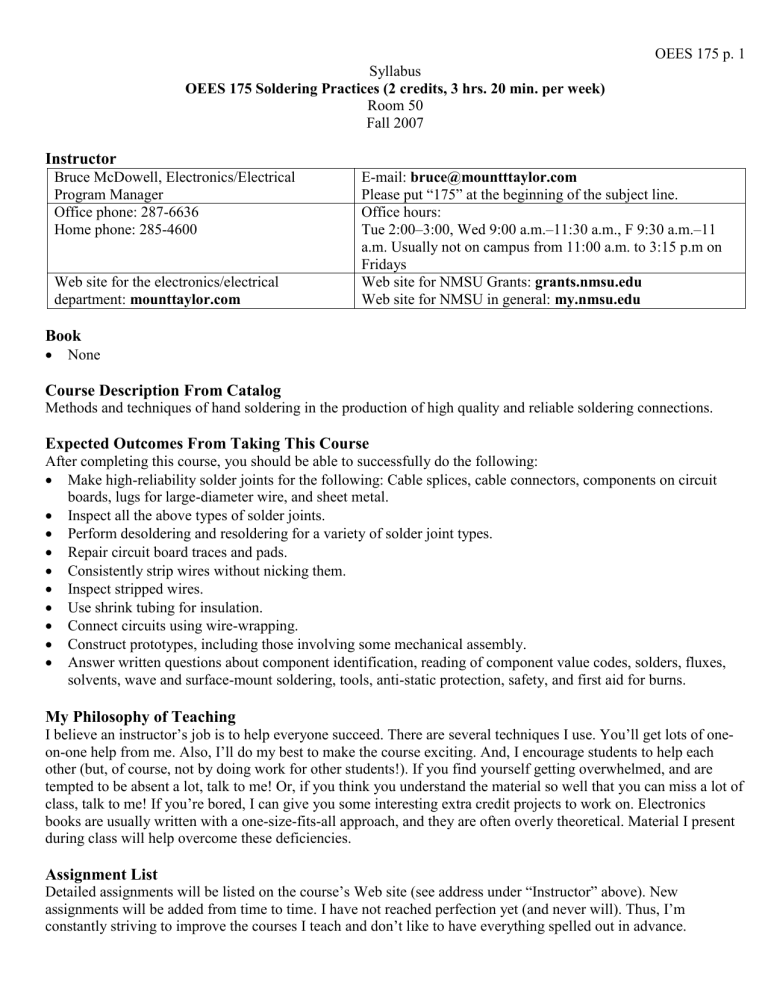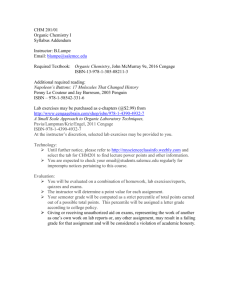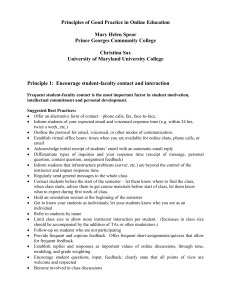Course Information Sheet

OEES 175 p. 1
Web site for the electronics/electrical department: mounttaylor.com
Book
None
Syllabus
OEES 175 Soldering Practices (2 credits, 3 hrs. 20 min. per week)
Room 50
Fall 2007
Instructor
Bruce McDowell, Electronics/Electrical
Program Manager
Office phone: 287-6636
Home phone: 285-4600
E-mail: bruce@mountttaylor.com
Please put “175” at the beginning of the subject line.
Office hours:
Tue 2:00–3:00, Wed 9:00 a.m.–11:30 a.m., F 9:30 a.m.–11 a.m. Usually not on campus from 11:00 a.m. to 3:15 p.m on
Fridays
Web site for NMSU Grants: grants.nmsu.edu
Web site for NMSU in general: my.nmsu.edu
Course Description From Catalog
Methods and techniques of hand soldering in the production of high quality and reliable soldering connections.
Expected Outcomes From Taking This Course
After completing this course, you should be able to successfully do the following:
Make high-reliability solder joints for the following: Cable splices, cable connectors, components on circuit boards, lugs for large-diameter wire, and sheet metal.
Inspect all the above types of solder joints.
Perform desoldering and resoldering for a variety of solder joint types.
Repair circuit board traces and pads.
Consistently strip wires without nicking them.
Inspect stripped wires.
Use shrink tubing for insulation.
Connect circuits using wire-wrapping.
Construct prototypes, including those involving some mechanical assembly.
Answer written questions about component identification, reading of component value codes, solders, fluxes, solvents, wave and surface-mount soldering, tools, anti-static protection, safety, and first aid for burns.
My Philosophy of Teaching
I believe an instructor’s job is to help everyone succeed. There are several techniques I use. You’ll get lots of oneon-one help from me. Also, I’ll do my best to make the course exciting. And, I encourage students to help each other (but, of course, not by doing work for other students!). If you find yourself getting overwhelmed, and are tempted to be absent a lot, talk to me! Or, if you think you understand the material so well that you can miss a lot of class, talk to me! If you’re bored, I can give you some interesting extra credit projects to work on. Electronics books are usually written with a one-size-fits-all approach, and they are often overly theoretical. Material I present during class will help overcome these deficiencies.
Assignment List
Detailed assignments will be listed on the course’s Web site (see address under “Instructor” above). New assignments will be added from time to time. I have not reached perfection yet (and never will). Thus, I’m constantly striving to improve the courses I teach and don’t like to have everything spelled out in advance.
OEES 175 p. 2
Important Dates
August 31: Last day to register for a (16-week) class
September 3: Labor Day holiday
October 16: Last day to drop a (16-week) class with a W
(instead of an F)
Components of Your Grade for the Class
Lab work and class exercises
November 16 : Last day to withdraw from NMSU
November 22 - 24: Thanksgiving holiday
December 10 - 14: Final Exam week
Surprise quizzes (Relax, I have to make them easier than non-surprise quizzes!)
Instructor’s evaluation (A subjective assessment taking into account classroom behavior, attendance, extra credit, giving help to other students, and getting help from other students. Will normally be used only to raise your grade if warranted. It can have a negative effect on your grade if your classroom behavior has been a problem.)
Final Exam
Total
85%
3%
10%
2%
100%
Grading Scale for the Course
95 - 100% A
90 - 94% B
70 - 89% C
60 - 69%
0 - 59%
D
F
Why This Grading Scale?
I believe that the basics are highly important, and I stress them a lot in quizzes and assignments. My quizzes and assignments are easier than they would be with the more common 90%=A, 80%=B, etc. grading scale.
Because of this, the 90%=A scale results in too many A’s and B’s. The good news is that with my grading scale, you’d have to be a total goof-off to get lower than a C in the class! I feel that anyone who has mastered the basics deserves at least a C.
Homework, Class Exercises, and Lab Work
1.
For the first day an assignment is late , you will lose 10%. After that you will lose 10% for each week the assignment is late. However, if your assignment is very late, you will not lose more than 30%. No credit will be given for late assignments turned in during the last two weeks of the semester.
2.
Class exercises cannot be made up . However, your Extra Credit Grade will be substituted for the first three class exercises you miss.
3.
At the end of the semester, I will tally up points for assignments and class exercises. I will then make a grading curve for points earned for assignments, class exercises, and lab work.
(i.e., so many points = A, so many =
B, etc.)
Quizzes
Written quizzes will usually have questions about such things as reading component value codes. Some quizzes may be hands-on exercises where you are asked to do something in the lab.
Instead of makeup quizzes, I will use your Extra Credit Grade for any quizzes you’ve missed.
Extra Credit
After the course is over, I will tally-up extra credit points. I will then make a grading curve to determine how many points for an A, how many for a B, etc. Your extra credit grade will help you in the following ways:
Used to help me determine your Instructor's Evaluation score.
Used as your grade when you miss a quiz or a class exercise (first three class exercises only).
OEES 175 p. 3
Attendance and Punctuality
Electronics/electrical classes are not like some other classes where you can read the book and catch up. Much of the learning in our class will be of a hands-on nature, with class exercises and interaction with the instructor being an important part. Arriving late or being absent will make grasping the concepts of this class more difficult for you.
Important Notes to Students
Kids: Don’t let your kids run wild while you’re in class. They must be supervised at all times.
Americans With Disabilities Act (ADA): If you have, or believe you have, a disability and would benefit from any accommodation(s), you may wish to register with the Student Services Office on the first floor of Martinez Hall. All medical information will be treated confidentially.
After you have registered, please make sure that your instructors receive a copy of the accommodation memorandum from Student Services within the first two weeks of class. It will be your responsibility to inform your instructors or the office of Student Services (in a timely manner) if the services/accommodations provided are not meeting your needs.
If you have a condition that may affect your ability to exit safely from the premises in an emergency or that may cause an emergency during class, you are encouraged to discuss any concerns with Ms. Irene Lutz, Campus Student
Services Officer at 287-6629, or with your instructor(s).
Feel free to call Ms. Lutz at the number above or Mr. Paul Gayle-Smith, NMSU Director of Institutional Equity, at
(505)646-3635 with any questions about the Americans with Disabilities Act (ADA), and/or Section 504 of the
Rehabilitation Act of 1973.
Academic misconduct: Any Student found guilty of academic misconduct shall be subject to disciplinary action.
Academic misconduct includes, but is not limited to, the following actions: cheating; plagiarism; unauthorized possession of examinations, reserve library materials, or laboratory materials; unauthorized changing of grades on an examination, instructor’s grade book, or grade report; nondisclosure or misrepresentation in filing out applications or other college records; or violation of computer use policies. The following disciplinary actions and sanctions may be imposed for any of the above infractions or regulations: disciplinary probation, disciplinary suspension, dismissal, expulsion.
The temptation is great to turn in work done (in all or in part) by other students. I frequently catch students who do this. Don’t take the chance!
Except for such cheating, I’m a very merciful instructor and will give you lots of help during class and office hours to insure that you do well. Talk to me if you’re worried about getting a low grade.







